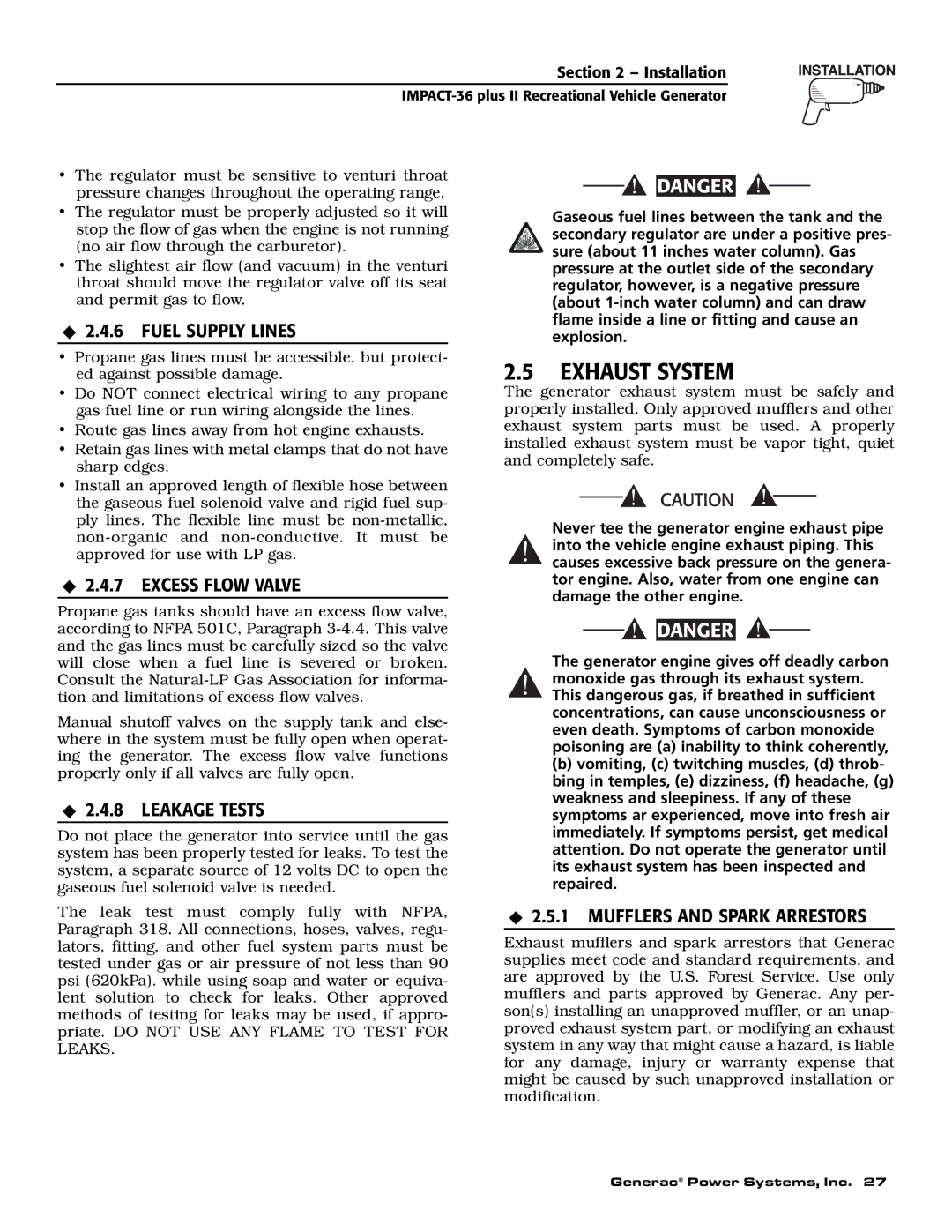
Section 2 – Installation
IMPACT-36 plus II Recreational Vehicle Generator
•The regulator must be sensitive to venturi throat pressure changes throughout the operating range.
•The regulator must be properly adjusted so it will stop the flow of gas when the engine is not running (no air flow through the carburetor).
•The slightest air flow (and vacuum) in the venturi throat should move the regulator valve off its seat and permit gas to flow.
◆2.4.6 FUEL SUPPLY LINES
•Propane gas lines must be accessible, but protect- ed against possible damage.
•Do NOT connect electrical wiring to any propane gas fuel line or run wiring alongside the lines.
•Route gas lines away from hot engine exhausts.
•Retain gas lines with metal clamps that do not have sharp edges.
•Install an approved length of flexible hose between the gaseous fuel solenoid valve and rigid fuel sup- ply lines. The flexible line must be
◆2.4.7 EXCESS FLOW VALVE
Propane gas tanks should have an excess flow valve, according to NFPA 501C, Paragraph
Manual shutoff valves on the supply tank and else- where in the system must be fully open when operat- ing the generator. The excess flow valve functions properly only if all valves are fully open.
◆2.4.8 LEAKAGE TESTS
Do not place the generator into service until the gas system has been properly tested for leaks. To test the system, a separate source of 12 volts DC to open the gaseous fuel solenoid valve is needed.
The leak test must comply fully with NFPA, Paragraph 318. All connections, hoses, valves, regu- lators, fitting, and other fuel system parts must be tested under gas or air pressure of not less than 90 psi (620kPa). while using soap and water or equiva- lent solution to check for leaks. Other approved methods of testing for leaks may be used, if appro- priate. DO NOT USE ANY FLAME TO TEST FOR LEAKS.
![]()
![]() DANGER
DANGER
Gaseous fuel lines between the tank and the secondary regulator are under a positive pres- sure (about 11 inches water column). Gas pressure at the outlet side of the secondary regulator, however, is a negative pressure (about
2.5EXHAUST SYSTEM
The generator exhaust system must be safely and properly installed. Only approved mufflers and other exhaust system parts must be used. A properly installed exhaust system must be vapor tight, quiet and completely safe.
Never tee the generator engine exhaust pipe
!into the vehicle engine exhaust piping. This causes excessive back pressure on the genera- tor engine. Also, water from one engine can damage the other engine.
![]()
![]() DANGER
DANGER
The generator engine gives off deadly carbon
!monoxide gas through its exhaust system. This dangerous gas, if breathed in sufficient concentrations, can cause unconsciousness or even death. Symptoms of carbon monoxide poisoning are (a) inability to think coherently,
(b) vomiting, (c) twitching muscles, (d) throb- bing in temples, (e) dizziness, (f) headache, (g) weakness and sleepiness. If any of these symptoms ar experienced, move into fresh air immediately. If symptoms persist, get medical attention. Do not operate the generator until its exhaust system has been inspected and repaired.
◆2.5.1 MUFFLERS AND SPARK ARRESTORS
Exhaust mufflers and spark arrestors that Generac supplies meet code and standard requirements, and are approved by the U.S. Forest Service. Use only mufflers and parts approved by Generac. Any per- son(s) installing an unapproved muffler, or an unap- proved exhaust system part, or modifying an exhaust system in any way that might cause a hazard, is liable for any damage, injury or warranty expense that might be caused by such unapproved installation or modification.
Generac® Power Systems, Inc. 27
